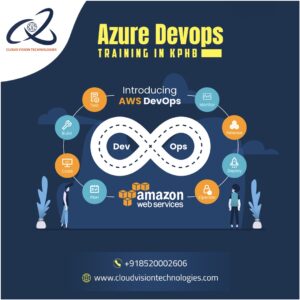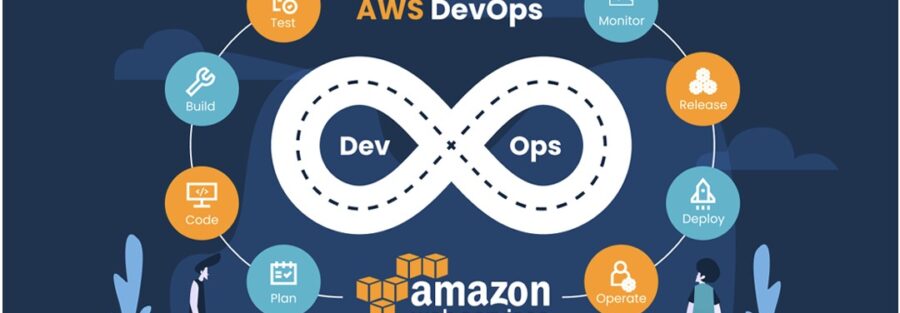Introduction to Azure DevOps
Azure DevOps Training in KPHB. In today’s fast-evolving digital landscape, the demand for faster, more reliable software delivery is higher than ever. Businesses must continuously innovate, improve operational efficiency, and respond quickly to changing market needs. This is where Azure DevOps plays a critical role. Offered by Microsoft, Azure DevOps is a comprehensive suite of development and collaboration tools that enables organizations to implement DevOps practices seamlessly across their application lifecycle. Cloud Vision Technologies.
Whether you are developing cloud-native applications, modernizing legacy systems, or managing complex software projects, Azure DevOps provides all the essential tools in one platform. It helps teams plan, develop, test, deliver, and operate applications efficiently while promoting collaboration between development and operations teams. By integrating automation, continuous delivery, and project management, Azure DevOps empowers businesses to streamline workflows, accelerate product releases, and maintain high-quality standards across all stages of software development. Azure DevOps Training in KPHB.

What is Azure DevOps?
Azure DevOps is a cloud-based platform that offers a full set of tools to manage the Software Development Lifecycle (SDLC) end-to-end. It seamlessly integrates various phases of software development from planning and coding to testing, deployment, and monitoring into a single, unified ecosystem. Organizations that adopt Azure DevOps can eliminate the complexity of managing multiple disconnected toolchains and instead rely on a single, integrated solution that enhances productivity and collaboration. Azure DevOps Training in KPHB.
Key Features of Azure DevOps
Azure DevOps offers a complete suite of tools that streamline the software development and delivery process. Here’s a detailed look at its core features:
Azure Repos
Azure Repos provides unlimited, cloud-hosted private Git repositories, enabling development teams to collaborate securely and efficiently on their source code. It supports powerful version control systems, allowing teams to track changes, manage branches, and maintain a clear development history. Developers can implement robust branching strategies like GitFlow or trunk-based development, facilitating better parallel development.
With built-in features like pull requests and code reviews, Azure Repos fosters a collaborative coding environment, improving code quality and encouraging best practices across teams. Integration with other Azure DevOps services also ensures seamless workflows from code creation to deployment. Azure DevOps Training in KPHB.
Azure Pipelines
Azure Pipelines is a cloud-native continuous integration and continuous deployment (CI/CD) service that automates building, testing, and deploying applications. It supports a wide range of languages and platforms, including .NET, Java, Node.js, Python, and more, across Windows, Linux, and macOS environments. Azure DevOps Training in KPHB.
Azure Pipelines can integrate with Kubernetes clusters, virtual machines, and serverless platforms, providing full flexibility for modern cloud applications. With powerful features like parallel job execution, multi-stage pipelines, and YAML configuration, Azure Pipelines helps accelerate software delivery while ensuring high quality and consistency in deployments.
Azure Boards
Azure Boards is a comprehensive project management solution designed to help teams plan, track, and manage work more effectively. It offers a range of agile tools such as Kanban boards, scrum support, backlogs, user stories, work items, and dashboards to visualize progress in real time. By using Azure Boards, teams can customize workflows, prioritize tasks, and foster transparency across the software development lifecycle.
It also integrates seamlessly with Azure Repos, GitHub, and external tools like Slack, providing real-time updates and boosting team collaboration. Whether managing a small project or coordinating across large enterprises, Azure Boards enables better visibility, accountability, and agile project delivery. Azure DevOps Training in KPHB.
Azure Test Plans
Azure Test Plans offer a complete solution for managing and executing manual and exploratory testing efforts. Teams can easily create test cases, test suites, and test runs, helping validate application functionality and ensuring quality before production releases Testers can log defects directly from test runs, capture screenshots, and record rich data to assist developers in reproducing and fixing issues quickly. Azure DevOps Training in KPHB.
Azure Test Plans support browser-based testing and integration with automated test frameworks, enabling both manual and automated testing within a unified platform. By embedding testing early in the development cycle, teams can detect defects sooner, reduce rework, and improve overall product reliability. Azure DevOps Training in KPHB.
Azure Artifacts
Azure Artifacts simplifies package management by enabling teams to create, host, and share packages from public or private sources. It supports a variety of package formats including Maven, npm, Python, and NuGet, allowing seamless integration into build and release pipelines. Azure DevOps Training in KPHB.
Azure Artifacts provides advanced features like package versioning, upstream sources, and scoped feeds, making dependency management more reliable and efficient. By centralizing artifact storage, development teams can maintain a secure and consistent supply of libraries, tools, and components necessary for application builds, minimizing the risk of broken builds and dependency issues. Azure DevOps Training in KPHB.
Benefits of Using Azure DevOps
Azure DevOps provides a comprehensive suite of tools that empowers organizations to improve their software development and delivery processes. Here are the key benefits of adopting Azure DevOps for your organization:
End-to-End DevOps Platform
Azure DevOps serves as a complete platform to manage your entire software development lifecycle (SDLC) from planning and coding to testing, deployment, and monitoring. By consolidating tools such as Azure Boards, Azure Repos, Azure Pipelines, Azure Test Plans, and Azure Artifacts in one cohesive platform, Azure DevOps eliminates the need for fragmented toolchains and simplifies collaboration between development, operations, and security teams. Azure DevOps Training in KPHB.
Cloud Agnostic
One of the standout features of Azure DevOps is its cloud-agnostic nature, enabling you to deploy applications to various environments beyond just Azure. Whether you prefer to deploy to AWS, Google Cloud Platform (GCP), or manage on-premises infrastructure, Azure DevOps supports multi-cloud environments and allows for seamless deployment and operations. This flexibility ensures that organizations are not locked into a single cloud provider, enabling teams to leverage the best tools and pricing models that align with their unique infrastructure needs. Azure DevOps Training in KPHB.

Scalability
Azure DevOps is built with scalability in mind. As your projects grow, whether it’s the number of teams, code repositories, or CI/CD pipelines, Azure DevOps makes it easy to scale your operations. Azure DevOps can handle a growing volume of development activities and deploy to thousands of virtual machines without compromising performance.
Integration-Friendly
Azure DevOps seamlessly integrates with a wide range of third-party tools and services, making it highly adaptable to your existing development ecosystem. It supports integration with popular tools such as Jenkins, GitHub, Slack, Terraform, SonarQube, and more. This flexibility allows teams to continue using their preferred tools while benefiting from Azure DevOps’ powerful automation, tracking, and reporting capabilities.Azure DevOps Training in KPHB.
The platform’s REST APIs and service hooks ensure that you can build custom integrations or automate workflows to suit your specific needs. Azure DevOps’ ability to integrate with both open-source tools and enterprise solutions makes it a versatile and future-proof choice for businesses of all sizes. Azure DevOps Training in KPHB.
Enterprise-Grade Security
When it comes to enterprise environments, security is paramount. Azure DevOps is designed with enterprise-grade security in mind, offering a suite of built-in features to help protect sensitive data, manage access control, and maintain compliance. With features such as Azure Active Directory (AAD) integration for identity and access management, role-based access control (RBAC), and granular permission settings, you can ensure that the right people have the right access at every stage of the development process.
Additionally, Azure DevOps offers robust audit logs, data encryption, and compliance certifications, ensuring that your development processes meet industry standards for privacy and security. This makes it an ideal choice for highly regulated industries, including finance, healthcare, and government. Azure DevOps Training in KPHB.
Flexibility
Azure DevOps offers unmatched flexibility in how you choose to use it. While it provides a comprehensive end-to-end solution, you don’t have to use all its services. You can adopt the tools that best fit your needs and integrate them into your existing workflows. For example, you might only use Azure Pipelines for CI/CD, while leveraging Azure Repos for version control and Azure Boards for agile project management. Azure DevOps Training in KPHB.
This modular approach means that Azure DevOps can grow with your team and evolve according to your needs, without forcing you to adopt unnecessary services. Whether you’re just starting your DevOps journey or you’re looking to optimize a mature pipeline, Azure DevOps gives you the flexibility to scale up or down as required. Azure DevOps Training in KPHB.
Common Use Cases for Azure DevOps
Azure DevOps offers a wide range of tools that can be utilized for various use cases across different industries. Below are some of the most common and impactful use cases where organizations are leveraging Azure DevOps to streamline their processes and deliver high-quality software:
Continuous Delivery of Web Applications
One of the primary use cases of Azure DevOps is enabling continuous delivery (CD) for web applications. By automating the code deployment process across multiple environments (e.g., development, staging, production), Azure DevOps ensures that updates and new features are released quickly, reliably, and without disruption. With Azure Pipelines, you can automate the entire pipeline from source code management (using Azure Repos) to building, testing, and deploying the application. Azure DevOps Training in KPHB.
Azure DevOps supports rolling deployments, blue-green deployments, and can even handle zero-downtime deployments, ensuring your web application is always up-to-date and available to users. This automated delivery pipeline helps businesses respond faster to market demands, reduce human error, and improve product quality by minimizing manual intervention. Azure DevOps Training in KPHB.
Infrastructure as Code (IaC)
With Infrastructure as Code (IaC), teams can automate and manage the deployment of cloud infrastructure using code. Azure DevOps integrates seamlessly with tools like Azure Resource Manager (ARM) templates and Terraform, enabling you to define, deploy, and manage infrastructure resources such as virtual machines, databases, and storage all through code. Azure DevOps Training in KPHB.
By using Azure Pipelines for IaC, you can ensure consistency, version control, and faster provisioning of infrastructure. This approach reduces the risk of human error, enables repeatable deployments, and improves scalability and security. With IaC, developers can treat infrastructure in the same way as application code, making it easier to version, test, and deploy changes as part of the CI/CD pipeline.
Agile Project Management
Azure DevOps is an excellent tool for organizations adopting Agile practices.
Azure Boards provides comprehensive tools for planning, tracking, and managing software development projects. You can create user stories, backlogs, and work items to prioritize tasks and plan sprints. The Kanban boards, scrum boards, and dashboards allow teams to visualize work, track progress in real-time, and manage iterations and release plans effectively. Azure DevOps Training in KPHB.
This provides greater transparency into the development process and ensures teams stay on track with their goals. Azure Boards integrates well with other Azure DevOps services and external tools, making it a centralized hub for collaboration, reporting, and tracking throughout the development lifecycle.
Automated Testing
Automated testing is another critical use case for Azure DevOps, helping teams maintain high-quality software and detect issues earlier in the development process. With Azure Test Plans, you can create automated test scripts, integrate them directly into your CI/CD pipelines, and run them as part of the build process. Azure DevOps supports various testing frameworks, including unit tests, integration tests, UI tests, and performance tests, making it possible to validate code quality at every stage of the pipeline.
Package Management
Azure Artifacts simplifies the process of managing build artifacts and package dependencies, ensuring smooth and efficient software delivery. Azure Artifacts allows teams to store, share, and manage packages (such as npm, NuGet, Maven, and Python) from both public and private sources. This helps developers streamline their build process by ensuring that all dependencies are readily available and easy to manage.
With versioning and dependency management features, teams can maintain consistent versions of libraries and components across their development environments, reducing the risk of version conflicts and errors. Azure Artifacts also integrates with Azure Pipelines, allowing you to automatically download and deploy the correct versions of packages as part of your CI/CD process. This centralizes package management and makes it easier to manage dependencies throughout the entire software lifecycle.
Best Practices for Azure DevOps Implementation
Adopt Agile Methodologies
Implementing Azure DevOps within an Agile framework ensures that development teams are able to work collaboratively, adapt to changing requirements, and deliver software incrementally. Azure DevOps provides tools like Azure Boards to implement Agile practices like Scrum or Kanban effectively. Azure Boards offers features such as work item tracking, sprint planning, and backlog management, allowing teams to organize and prioritize tasks. By adopting Agile methodologies, teams can continuously iterate on features, maintain high-quality standards, and improve the product based on regular feedback from stakeholders. This iterative approach promotes flexibility, rapid delivery, and higher customer satisfaction. Azure DevOps Training in KPHB.
Enable CI/CD Early
Continuous Integration (CI) and Continuous Deployment (CD) are crucial for streamlining software development, testing, and delivery. Setting up Azure Pipelines as early as possible enables automatic building, testing, and deployment of applications, minimizing human error and accelerating the delivery cycle. With Azure Pipelines, you can automate the entire lifecycle, from code commit to production deployment. This ensures that developers can quickly identify bugs or issues early in the development process, reducing the time and effort spent on manual interventions. A robust CI/CD pipeline promotes consistent and reliable software delivery, enabling teams to release features faster while maintaining quality.
Embrace Infrastructure as Code (IaC)
Infrastructure as Code (IaC) is a fundamental principle in modern DevOps practices that enables you to manage and provision infrastructure using code rather than manual processes. In Azure, you can leverage tools like Azure Resource Manager (ARM) templates or Terraform to define and deploy your cloud infrastructure consistently. This approach not only ensures repeatability but also helps maintain version control over your infrastructure, making it easier to track changes and roll back if necessary.
By adopting IaC, you enhance collaboration between development and operations teams, reduce configuration drift, and make your infrastructure more scalable and cost-effective. Furthermore, with IaC, it’s easier to set up and manage environments across multiple regions or cloud subscriptions. Azure DevOps Training in KPHB.
Monitor and Optimize Pipelines
To maintain the efficiency and reliability of your CI/CD pipelines, it’s essential to continuously monitor and optimize their performance. Azure DevOps offers analytics and reporting tools that can provide detailed insights into your pipeline’s health, bottlenecks, and failure rates. By regularly reviewing this data, you can identify inefficiencies and areas for improvement, such as slow-running tests, flaky builds, or integration issues. Azure DevOps Training in KPHB.
Additionally, it’s important to optimize pipeline configurations, such as parallel builds or caching, to speed up execution and reduce unnecessary delays. Proactively monitoring pipeline performance ensures that you are not only catching issues early but also continually improving the speed and reliability of your software delivery process.

Implement Security from Day One
Security should never be an afterthought in the DevOps lifecycle. Implementing security practices from the very beginning of the development process is critical for building secure and resilient applications. Azure DevOps offers various tools and services to help embed security into your workflows. Azure Policy can enforce organizational security standards across resources, ensuring compliance and preventing misconfigurations. Azure DevOps Training in KPHB.
Azure DevOps Training in KPHB
One of the most significant advantages of Azure DevOps is its ability to streamline workflows. Through the automation of key processes such as build, testing, and deployment, teams can focus more on writing code and solving business problems, rather than managing manual processes. Azure DevOps ensures that the entire software development pipeline spanning from initial planning to production deployment is optimized for speed, quality, and reliability. The robust set of features in Azure DevOps allows for greater flexibility, scalability, and control over the development process, making it a suitable platform for organizations of all sizes. Azure DevOps Training in KPHB.
Conclusion
Azure DevOps provides a comprehensive set of tools that empower organizations to deliver applications faster, with greater quality, and in a more efficient manner. By utilizing Azure DevOps, businesses can achieve a higher level of collaboration and coordination across teams, enhancing the overall software development lifecycle. The integration of development and operations teams, known as DevOps, is a cornerstone of modern software development, and Azure DevOps excels in helping organizations bridge the gap between these traditionally siloed departments. Azure DevOps Training in KPHB.
Address: Cloud Vision Technologies
Location: Samhitha Enclave, 3rd floor, KPHB Phase 9, Kukatpally, Hyderabad, Telangana – 500072
Contact Number : +91 8520002606
Mail ID: info@cloudvisiontechnologies.com
Website: https://www.cloudvisiontechnologies.com



